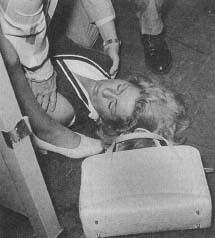Alice Crimmins Trials: 1968 & 1971
Trial Begins Three Years Later
Mutual resentment grew between Alice Crimmins and the police who suspected her. She angrily accused them of not working to find the real killers and stopped cooperating. Detectives and district attorneys viewed her hostility as evidence of guilt. Wiretaps, electronic surveillance, and hundreds of interviews with her neighbors and friends failed to produce any evidence. The district attorney's office tried twice to convince grand juries to indict her. Secret testimony made a third attempt successful. Alice Crimmins was accused of murdering Missy—there was not enough left of Eddie Jr.'s body to support a murder charge.
Her trial began in May 1968, nearly three years after the Crimmins children disappeared. Prosecutors called Dr. Milton Helpern to the stand. The renowned forensic pathologist testified that Missy Crimmins was strangled. He held that food in the child's stomach could not have been ingested more than two hours before her death. Helpern's testimony was irreconcilable with Alice Crimmins' insistence that she fed both children at 7:30 P.M., two hours before she put them to bed, and over four hours before midnight when she last saw them alive.
 Alice Crimmins fainted at the Queens Police Station where she faced charges of killing her two children,
Alice Crimmins fainted at the Queens Police Station where she faced charges of killing her two children,
One of Alice Crimmins' lovers, a contractor named Joe Rorech remembered her telling him a month before the expected custody battle that "she would rather see the children dead" than allow her husband to take them. The night of the disappearance, Rorech claimed to have called her apartment twice, receiving no answer at 2:00 A.M.
More damaging was Rorech's claim of a tearful admission in a Long Island restaurant 14 months after the children were found. "She said there was no reason for them to be killed, it was senseless," Rotech uneasily told the prosecutor. "I said Missy and Eddie are dead," and she said, "Joseph, please forgive me, I killed her."
"Joseph, that isn't true!" Crimmins cried from the defense table. When Judge Peter Farrell restored order, Rorech said that his conscience had later moved him to testify. He admitted to drinking heavily the day he called the apartment, opening the possibility that he might have dialed a wrong number. Rorech was a married man with seven children. The defense attacked him as a spiteful rejected lover, a perjurer whose marital and business problems were being exploited by the district attorney's office.
Additional topics
Law Library - American Law and Legal InformationNotable Trials and Court Cases - 1963 to 1972Alice Crimmins Trials: 1968 1971 - Trial Begins Three Years Later, Observed From Above, A New Trial, Suggestions For Further Reading